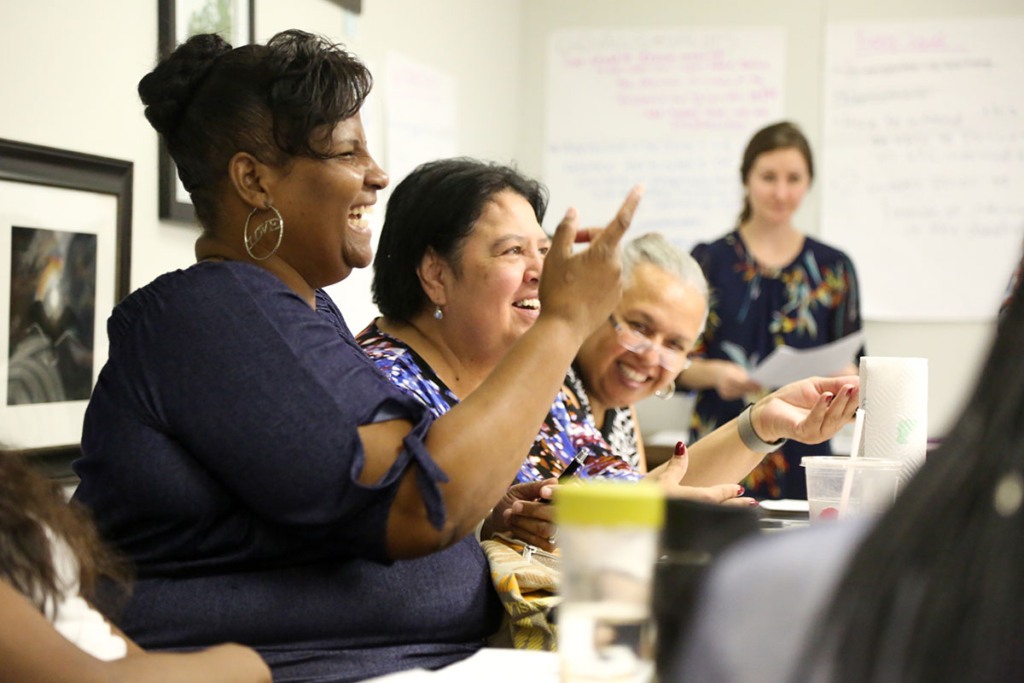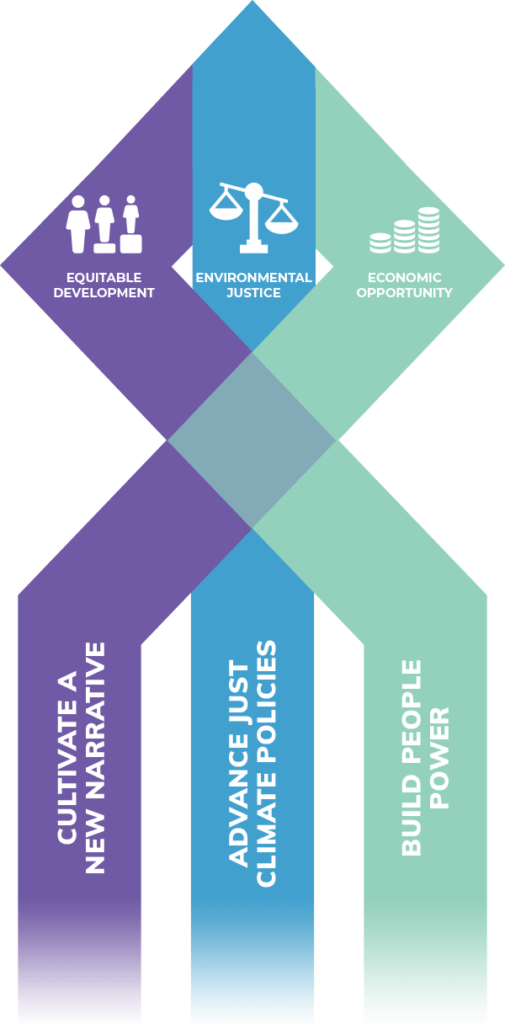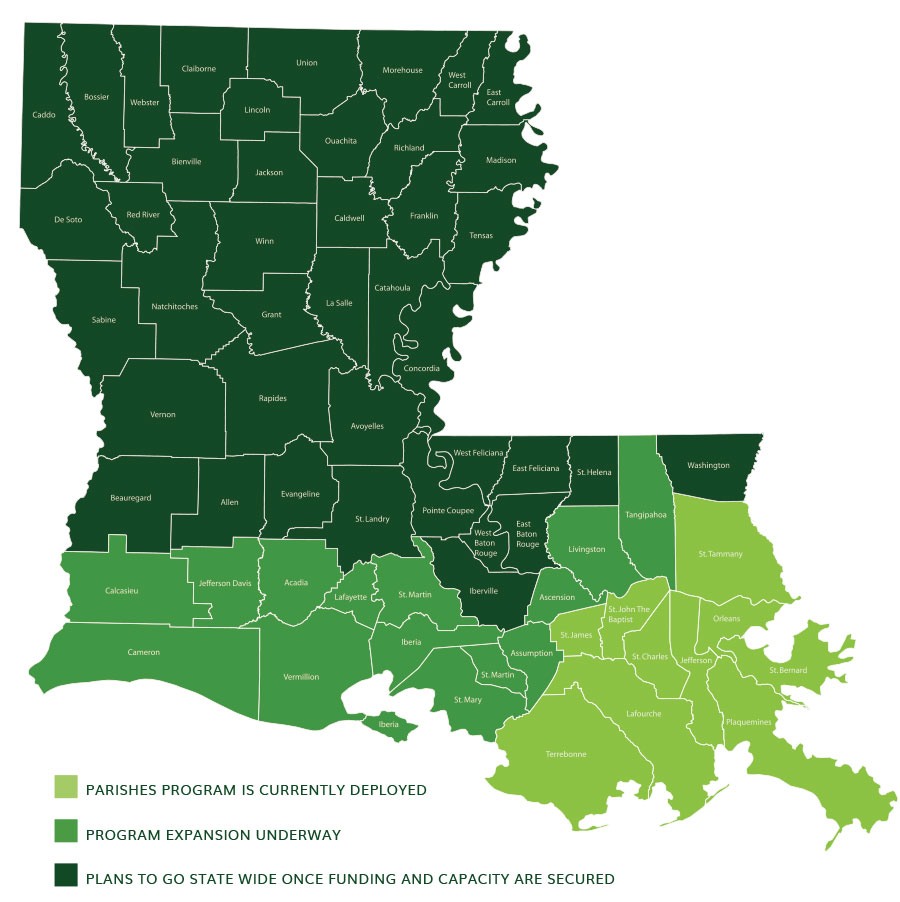Refuge
Keepers
No Man’s Land
- Live and work near toxic facilities like petrochemical companies which emit pollutants that shorten and impact the quality of life
- Reside in areas where there is more flooding
- Receive inadequate infrastructure to mitigate risks and prevent disasters
- Experience delayed and insufficient response and recovery investments during and after emergencies
Foundation for Change
Climate change is not a future scenario. For Black, Indigenous, People of Color and low-income communities, the problem exists right now.
The Foundation for Louisiana (FFL), a social justice philanthropic intermediary, continues to invest, build, and transform to support a Louisiana-based movement for climate justice.
In 2005, in the aftermath of Hurricane Katrina, FFL was founded as the Louisiana Disaster Recovery Foundation. This work led to a real awakening: systems of oppression are embedded in our policies and practices. Foundation for Louisiana has been investing in our coastal communities since its inception as Louisiana Disaster Recovery Foundation in the days following Hurricane Katrina.
In 2015, building on 10 years of working in coastal communities, FFL launched the Coastal Resilience Leverage Fund to offer a next-level response to Louisiana’s coastal crisis and its rippling impacts. The fund has evolved and expanded to become the Climate Justice portfolio. The portfolio has an analysis and provides support to organizations working to address: generational environmental injustice, coastal preservation and survival, disproportionate impacts on marginalized communities, and causes and effects of our changing climate.The Foundation for Louisiana (FFL), a social justice philanthropic intermediary, continues to invest, build, and act to support a Louisiana-based movement for climate justice.
In 2015, building on 10 years of working in coastal communities, FFL launched the Coastal Resilience Leverage Fund to offer a next-level response to Louisiana’s coastal crisis and its rippling impacts. Through deep analysis of equitable and just practices and outcomes, the fund has evolved and expanded to become the Climate Justice portfolio. The portfolio provides support to organizations working to address: generational environmental injustice, coastal preservation and survival, disproportionate impacts on marginalized communities, and causes and effects of our changing climate.
“Without action, climate change and our institutional responses to it will exacerbate existing inequities. Louisiana can lead for justice.”
— Liz Williams, FFL Climate Justice Program Director

Climate Justice Portfolio
The FFL Climate Justice portfolio centers its advocacy and grantmaking on communities experiencing disproportionate climate impacts while partnering with community, non-profit, public, private, and philanthropic partners to advance outcome-focused and impact-driven work. In the first five years of program activities, FFL has:
- Collaborated with partners to fund the design of entry-level, middle-skill, and small business workforce training and certification programs for water management employment opportunities through the National Green Infrastructure Certification Program.
- In partnership with the community and the State of Louisiana, co-hosted more than 70 public meetings with allies to understand how coastal change impacts Louisiana communities, which resulted in the establishment of projects, programs, and policy recommendations to mitigate risk through the LA SAFE process.
- Cultivated cross-field collaborations in housing, transit, economic opportunity, and public health, leveraging community expertise on coastal change towards the creation of Louisiana’s first Chief Resilience Officer position and engagement of all state agencies to address the climate crisis.
- Supported the research, analysis, and assessment of multiple coastal and climate trends affecting Louisiana, including watershed development impacts and climate-induced population movement, that resulted in the preparation of more than 20 reports to influence policy recommendations.
- Leveraged more than $5 million through the BuildNOLA Mobilization Fund to improve access to capital for Disadvantaged Business Enterprises (DBEs) in New Orleans, which has provided investment to companies owned by People of Color and women, producing sustainable wealth in Black and Brown communities.
- Launched the Bayou Region Incubator to bolster support for Louisiana entrepreneurs seeking economic opportunity in the water sector through contracts associated with coastal restoration and water management projects.
- Created and implemented a learning experience, LEAD the Coast, that connects community expertise to scientific data, leadership training, and durable advocacy strategies. Graduates have utilized new skills and built relationships through LEAD to: offer strategic testimony before Congressional committees, form their own nonprofits, and advance local and state-level policy changes.
In this time, we’ve learned that climate justice in Louisiana requires:
- An account of the land’s history
- An understanding of the systems of oppression
- The power to dismantle the harmful influence of destructive practices
- The influence to promote policies beneficial to our people
Now is the time to dismantle and replace old systems with innovative solutions, building together a healthy, vibrant, and just Louisiana.
“We will know we have arrived [to climate justice] when we have achieved organized grassroots leadership and taken back the power to influence and steward our own environment.”
— May Nguyen, FFL Board Member
Approaching Climate Justice Strategically, Through Values Towards Outcomes
While we recognize that there are many worthy causes in this work, we’ve chosen to lead our efforts in a direction that will lend the greatest potential for change. FFL works toward these priority areas in collaboration with our grantee partners and allies.
Equitable Development
We work with a determination to cultivate inclusive, vibrant, and affordable neighborhoods. We recognize that poverty rates in high-flood risk communities are increasing as residents with financial resources and regional networks move to lower-risk areas, shifting the resources of the areas that receive those new neighbors. This population loss results in diminishing revenues to maintain or fortify existing social services and infrastructural investments. Population gains elsewhere influence climate gentrification and predatory land acquisition. At FFL, we facilitate the development of community-based priorities, analysis, and policy recommendations for affordable housing and land use in low-, moderate-, and high-flood risk areas statewide. We support our residents in being key designers and decision-makers for the future of our built environment.

Environmental Justice
We work toward democracy-driven and equitable solutions to environmental racism. We are fighting for a future that ensures justice, health, and safety for the Black, Indigenous, People of Color, and low-income communities historically most impacted by environmental injustice. This work is centered around the wisdom and self-determination of these communities. We imagine a future where Louisiana’s land, water, and air are managed responsibly and there are policies in place that reduce greenhouse gas emissions, remediate toxicities in the air and soil, and preserve Louisiana’s natural resources for the generations that will follow ours. We envision a Louisiana where residents across the state work together to advance this future.
Equitable Opportunity
We work for access to relationships and strategies that generate wealth for marginalized communities. We are taking a stand to support equitable outcomes in procurement practices and policies, workforce development, and small business opportunities. We’re fighting for a future where Louisianans are not reliant on petrochemical, industrial economies that have traditionally failed communities by taking and destroying natural non-renewable resources, emitting toxins and greenhouse gases, and exhausting local revenue streams. We are working to ensure that billions of dollars in public funding to support coastal restoration, water management, and climate adaptation work in Louisiana creates good jobs and business opportunities for all Louisianans in a manner that demonstrates racial and gender equity. We’re fighting for a vibrant and equitable economic future, advanced by sustainable and substantial investment in green and blue economies. We seek a Louisiana where the freedom to thrive and prosper is available to all.
Program Spotlight: LEAD the Coast

To reach our goals, FFL has developed several initiatives, most notably LEAD the Coast, our Leadership, Education and Advocacy Development program. LEAD is a shared learning and policy advocacy training designed to connect resident leaders across the state and provide actionable tactics to advance change in their communities.
Building on the lessons learned through the Together Initiative founded in 2008, LEAD the Coast was launched in 2016 and revamped in 2019 in partnership with nine grantee partners. As of today, the program has had 6 cohorts across 10 parishes and more than 125 graduates. LEAD the Coast continues to deepen relationships and work toward an expanded network with its Inaugural LTC Fellowship Class in 2020 and upcoming coast-wide expansion.
Through shared learning sessions, LEAD the Coast empowers community leaders to:
- Combine knowledge gained by their real-life experiences with scientific data to form a unique understanding of situation
- Understand pathways for successful decision-making
- Consider past, present, and future intersections of climate change impacts to communities
- Develop networks through which to build power across Louisiana

6 COHORTS
10 PARISHES
9 GRANTEE PARTNERS
125 GRADUATES
Together, we can build a healthy, just and vibrant future.
Since 2015, Foundation for Louisiana has worked to invest almost $5.4 million in grants and activities towards climate justice. More than $54 million and counting in additional capital has been leveraged towards projects and programs identified in partnership with the community and implemented through collaborative grantmaking.
With the support of our many partners and allies across the state and nation, the investments and actions of the climate justice portfolio illustrate that values-based, equitable outcomes can build power in communities and lead to positive change.
In the next three years, we intend to attract and invest $7.5 million in the fight for climate justice. We are already experiencing the vast impacts of a changing climate to our communities and businesses. We have a responsibility toward equitable outcomes today if we want equity and justice for future generations.

$5.4 M
Invested Towards Climate Justice
$54.5 M
and counting leveraged, continuing to expand leverage for projects and programs!
Preparation and engagement to scale the LEAD the Coast program coastwide are ongoing.